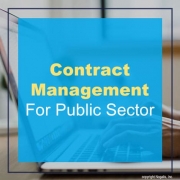Contract Management For Public Sector
Contract management is crucial for risk minimization, optimization and value creation, but in 2015 the NAO identified systematic weaknesses in both government and commercial sectors. The NAO’s 2015 Transforming Government Contract Management report notes that much remains to be done, including far-reaching changes in the culture of the public service and its ability to procure and manage commercial contracts. The report was triggered by the high-profile overbooking of the Ministry of Justice’s 10-year electronic surveillance contracts with G4S and Serco. Four years later, it is now recognized that effective contract management has been achieved in the commercial departments. However, the 2015 report found “systematic weaknesses” in government and commercial contract management in the day-to-day management of contracts. [Sources: 7]
In most government departments, contract management activities are scattered throughout the organization, involving many different people in different roles at different distances from the front. This makes a lot of sense, because the management of contracts is most effective when it takes place close to the goods and services supplied. Allegations of ineffective contract management for the public purse are most frequently cited, but the truth is that effective contract management applies equally to the private sector. Effective contract management is more than managing the specific words and clauses on paper. In reality, it is much more comprehensive: it covers all aspects of the value and risk arising from contracts. [Sources: 5]
The same applies to public institutions. As you can see, the public sector has many of the same forces that influence it as the private sector. There is therefore an increasing need for more and better contract management. Public sector bodies need to rely more on processes that control and manage internal costs. This means that challenges are being raised and there is a greater need for technology and process transformation to outsource a wide range of areas, including contract and commercial management. [Sources: 8]
It is not enough for organizations to have contract management specialists. Employees must be supplemented by process and software support in order to meet the increased compliance requirements and analytical requirements. The expected economic benefits and financial returns must be realized. [Sources: 1]
The basis of contract management is based on the implementation of successful upstream activities after the award. Further consideration will have to be given before the contract is awarded. In the pre-award phase, employees focus on the reasons for concluding the contract with the supplier and fulfilling the contractual conditions. [Sources: 1]
At a time when public authorities need to be diligent about how public dollars are spent, it is imperative that contracts with this aim be developed in mind before the process of managing contracts is completed. The contract should specify exactly what is expected of the contractor. [Sources: 4]
Furthermore, contracts should allow public sector parties to carry out audits of their quality management and management information systems to ensure that the contract remains sustainable. Public sector parties will also have to deal with the requirements of the Official Information Act 1982 as applied to them, including the types of access granted to them by internal and external auditors. They also need to have financial information to convince themselves of the continued financial viability of the public sector. [Sources: 2]
Disputes should be resolved as quickly as possible at the appropriate level of dispute settlement procedures, thereby promoting negotiation and mediation between the parties. There should be an agreed mechanism whereby the parties are mutually informed of the problems arising from the Treaty. [Sources: 2]
Often the only viable option is to settle the dispute in court. Costly litigation drives up the cost of providing services to public bodies, even if the agency wins, and that is because the agencies prepare for litigation by using staff time and agency resources. [Sources: 4]
Public procurement and contract management officials exacerbate the problem by building a cocoon around their offices, pretending that their offices “goals, tactics, and actions are independent of the company’s goals. Others create resentment by acting as policemen and enablers. They are unable or unwilling to push for strategic public procurement or contract management. Failure to plan procurement, define requirements, award and manage contracts costs public institutions dollars and opportunities in the short and long term. [Sources: 6]
We still have a long way to go before contract management gets the recognition it deserves. Understanding the challenges of contract management is an important step towards improving the situation. Addressing these challenges requires efforts by all public sector organizations. What matters is improving growth, and the International Association for Contract and Trade Management (IACCM) is a sign of this. Where it has gone wrong, it is clear how important it is for organizations to do better. [Sources: 0]
Given that we are in an interesting double Brexit storm and a second Covid wave, it is vital to understand its position as a single entity of government. It requires at least some basic forms of digitalization, spending analysis, and supplier contract management, so that suppliers can trust the government to weather the storms around them. It also requires transparency in the way money is spent. We believe that the next period will provide opportunities for public sector organizations to operate from one position: they are the customers of choice and can rely on them to accelerate cash flow to companies in difficult times. [Sources: 3]
Sources:
[0]: https://www.publicspendforum.net/blogs/peter-smith/2017/03/20/contract-management-europe-challenge-public-sector-procurement/
[1]: https://www.businessnewsdaily.com/4813-contract-management.html
[2]: https://oag.parliament.nz/2006/public-private/part4.htm
[3]: https://spendmatters.com/uk/why-supplier-and-contract-management-are-the-hot-topics-for-government-cpos-and-ccos-right-now/
[4]: https://www.bakertilly.com/insights/developing-effective-contracts-for-the-public-sector
[5]: https://www.proximagroup.com/why-contract-management-is-so-difficult-to-get-right-in-public-sector/
[6]: https://patimes.org/improving-procurement-contract-management-government/
[7]: https://www.civilserviceworld.com/articles/partner_article/proxima/why-contract-management-so-difficult-get-right-public-sector
[8]: https://www.capgemini.com/2015/09/contract-management-3-reasons-why-the-public-sector-is-looking-for/



